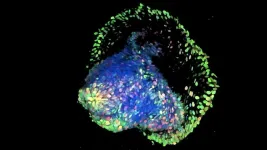(Press-News.org) One in five children has an identified mental health problem as early as age 3. Early detection is key to earlier intervention, and it also could prevent more severe conditions down the line, such as ADHD, depression and anxiety. Pediatric primary care is an ideal setting to conduct screening for mental health risk, given that pediatricians tend to have close, ongoing relationships with young patients and their families, and broad reach to historically marginalized communities. Since mental health screening of toddlers in primary care is uncommon, it is important to train pediatricians to do so without implicit bias and in a way that prevents unintended consequences, such as increased stigma.
Clinicians from Ann & Robert H. Lurie Children’s Hospital of Chicago will address these concerns in partnership with Northwestern University’s new Mental Health, Earlier Center funded by an $11.7 million award from the National Institute of Mental Health (NIMH) of the National Institutes of Health. They aim to reach approximately 1,200 toddlers by implementing screening for mental health risk across 30 clinics, and training pediatricians to communicate results to families and make decisions about next steps.
“We will work with pediatricians and parents to develop interactive training that is anti-racist, culturally responsive and specific to early childhood practice,” said Andrea Spencer, MD, Principal Investigator on the subproject of the NIMH grant that is focused on equity in screening toddlers for mental health risk. Dr. Spencer is Vice Chair for Research at the Pritzker Department of Psychiatry and Behavioral Health at Lurie Children’s and Associate Professor of Psychiatry and Behavioral Sciences at Northwestern University Feinberg School of Medicine.
“Since pediatricians might feel uncomfortable talking to families about the child’s mental health, especially when time is limited, they could be susceptible to unconscious bias in how they approach families from diverse backgrounds,” explained Dr. Spencer. “We want to help pediatricians conduct evidence-based screening that is effective and equitable.”
This training will involve weekly sessions over a few months via video conferencing. Each session will include a didactic portion and case consultations, allowing pediatricians to dissect actual screening situations that were challenging. This will be a supplement to the basic training on screening toddlers for mental health risk that pediatricians will receive as part of the overall Mental Health, Earlier Center implementation.
In addition to equity considerations, training content will be evaluated for potential ethical issues, in order to proactively address unintended consequences. This will be done prior to training implementation and as the training sessions progress.
“We have an ethical responsibility to consider how kids and families might be affected by mental health screenings in primary care, especially when it comes to children from minoritized groups,” said Seema Shah, JD, HEC-C, Ethicist at the Mental Health, Earlier Center and Co-Principal Investigator on the ethics subproject of the overall grant. She is the Director of Research Ethics and Founders' Board Chair of Medical Ethics at Lurie Children’s, as well as Professor of Pediatrics at Northwestern University Feinberg School of Medicine.
“We are thinking about how kids who are identified as having mental health risk at an early age might be treated when they start school, or if that identification of risk might become a self-fulfilling prophecy,” said Professor Shah. “On the other hand, pediatricians might worry about stigma and miss identifying a child who truly needs help. We want to make sure we address these types of concerns before and during the training rollout. Our project is novel because it integrates ethics, equity and implementation science.”
The core team at the Mental Health, Earlier Center also includes Michelle Macy, MD, MS, from Lurie Children’s, who leads the overall evaluation of the project. “It will be important to evaluate the effectiveness of these trainings so we can learn how to continue improving the training content and implementation, and so our efforts can be replicated and expanded,” said Dr. Macy, Director of Mary Ann & J. Milburn Smith Child Health Outcomes, Research and Evaluation Center at Stanley Manne Children’s Research Institute at Lurie Children’s, and Professor of Pediatrics at Northwestern University Feinberg School of Medicine. “We want to make sure that we proceed with equity and ethics in mind. Ultimately, we hope that toddlers who are showing signs of mental health concerns receive earlier intervention that prevents more challenging psychiatric conditions.”
The team from Lurie Children’s involved in projects through the Mental Health, Earlier Center also include Audrey Brewer, MD, MPH, Susan Friedland, MD, John Parkhurst, PhD, Alize Jaffe Sass, PhD, and John Walkup, MD.
Ann & Robert H. Lurie Children’s Hospital of Chicago is a nonprofit organization committed to providing access to exceptional care for every child. It is the only independent, research-driven children’s hospital in Illinois and one of less than 35 nationally. This is where the top doctors go to train, practice pediatric medicine, teach, advocate, research and stay up to date on the latest treatments. Exclusively focused on children, all Lurie Children’s resources are devoted to serving their needs. Research at Lurie Children’s is conducted through Stanley Manne Children’s Research Institute, which is focused on improving child health, transforming pediatric medicine and ensuring healthier futures through the relentless pursuit of knowledge. Lurie Children’s is the pediatric training ground for Northwestern University Feinberg School of Medicine. It is ranked as one of the nation’s top children’s hospitals by U.S. News & World Report.
END
Lurie Children’s helps train pediatricians to screen toddlers for mental health risk, with equity and ethics in mind
2024-10-24
ELSE PRESS RELEASES FROM THIS DATE:
UTEP researchers develop low-cost device that detects cancer in an hour
2024-10-24
EL PASO, Texas (Oct. 24, 2024) – Researchers at The University of Texas at El Paso have created a portable device that can detect colorectal and prostate cancer more cheaply and quickly than prevailing methods. The team believes the device may be especially helpful in developing countries, which experience higher cancer mortality rates due in part to barriers to medical diagnosis.
“Our new biochip device is low-cost — just a few dollars — and sensitive, which will make accurate disease diagnosis accessible to anyone, ...
Texas A&M physicist Kevin Kelly earns American Physical Society Early Career Award
2024-10-24
Dr. Kevin J. Kelly, an assistant professor in the Department of Physics and Astronomy at Texas A&M University and a member of the George P. and Cynthia Woods Mitchell Institute for Fundamental Physics and Astronomy, has been selected as the 2025 recipient of the American Physical Society’s Henry Primakoff Award for Early-Career Particle Physics in recognition of his contributions and promising career potential in fundamental particle physics and cosmology.
Kelly, who joined the Texas A&M faculty in 2022, works at the interface of two of the biggest outstanding mysteries in particle physics: ...
University of Maryland researcher awarded $1.8 million to study climate change’s impact on people with kidney disease
2024-10-24
Climate change is driving more extreme heat and more air pollution from wildfires, each of which put human health at risk. Now, new research funded by the federal Agency for Healthcare Research and Quality (AHRQ) and led by University of Maryland School of Public Health Professor Dr. Amir Sapkota, will study how these hazards independently and jointly impact already vulnerable groups, such as people living with end stage kidney disease (ESKD). The researchers aim to identify preventative solutions.
“During extreme heat, the damaged kidneys of people with ESKD do not regulate fluid levels very ...
Johns Hopkins Children’s Center research in mice suggests zinc supplements have potential value to directly treat short bowel syndrome
2024-10-24
Researchers from Johns Hopkins Children’s Center say they have identified a gene pathway involving the mineral zinc in mice that may someday point the way to using zinc-based supplements to directly help people with a rare disorder called short bowel syndrome (SBS).
The findings, published Oct. 7 in Nature Communications, help advance efforts toward more effective, potential treatment regimens for both children and adults with the debilitating condition.
SBS, which affects 10,000–20,000 adults and children in the United States, is marked by damage to and shortening of ...
Kalinin receives David Adler Lectureship Award
2024-10-24
Sergei Kalinin, a professor in the Department of Materials Science and Engineering, has been named the winner of the David Adler Lectureship Award in the Field of Materials Physics by the American Physical Society. The award recognizes one outstanding contributor in the field of materials physics who is notable for high-quality research, review articles, and lecturing.
“I am deeply honored to receive the Adler Award, as it recognizes the critical transition in materials discovery that my colleagues at the University of Tennessee and Pacific Northwest National Laboratory and I have championed,” ...
Evaluating the link between chemicals and declining insect populations
2024-10-24
Few people are fans of stink bugs, mosquitoes, or boll weevils, but insects play a key role in the circle of life that makes up the planet’s environment. In fact, world-renowned biologist E. O. Wilson famously declared that if insects vanished, our environment would collapse.
Scientists have noted that insect behaviour has been changing, and their populations are declining – on average 2-3% per year. This has prompted them to investigate the potential causes of this change, such as habitat loss due to overdevelopment, climate change, and chemical use.
EMBL researchers and collaborators recently investigated how pesticides, herbicides, ...
Scientists discover molecules that store much of the carbon in space
2024-10-24
A team led by researchers at MIT has discovered that a distant interstellar cloud contains an abundance of pyrene, a type of large, carbon-containing molecule known as a polycyclic aromatic hydrocarbon (PAH).
The discovery of pyrene in this far-off cloud, which is similar to the collection of dust and gas that eventually became our own solar system, suggests that pyrene may have been the source of much of the carbon in our solar system. That hypothesis is also supported by a recent finding that samples returned from the near-Earth asteroid Ryugu contain large quantities of pyrene.
“One of the big questions in ...
Sublethal agrochemical exposure disrupts insect behavior and long-term survivability
2024-10-24
Even at concentrations too low to kill, exposure to widely used agrochemicals – pesticides, herbicides, and fungicides, among others – has pervasive negative impacts on insect behavior and physiology, researchers report. The findings highlight the need for more comprehensive pesticide assessments, focusing not just on lethality but also on unintended long-term ecological harm to safeguard biodiversity. Over the past decade, many reports have highlighted alarming declines in insect ...
Understanding that US wildfires are becoming faster-moving is key to preparedness
2024-10-24
“The modern era of megafires is often defined based on wildfire size,” say Jennifer Balch and colleagues in a new study, “but it should be defined based on how fast fires grow and their consequent societal impacts.” Balch and colleagues report that wildfire growth rates in the U.S. have surged over 250% over the last 2 decades. Although these fast-moving infernos, or “fast fires” – those spreading more than 1,620 hectares in a day – account for only 2.7% of wildfire events from 2001 to 2020, researchers report that they are responsible for 89% of the total structures damaged ...
Model predicts PFAS occurrence in groundwater in the US
2024-10-24
According to a new machine learning-assisted predictive model, as many as 95 million Americans may rely on groundwater containing PFAS for their drinking water supplies before any treatment, researchers report. This raises concerns about unmonitored contamination in domestic and public water supplies. Per- and polyfluoroalkyl substances (PFAS), often called “forever chemicals,“ are highly persistent environmental contaminants linked to adverse environmental and health effects. Used in many consumer products, these organic pollutants have become ubiquitous in the environment and ...




